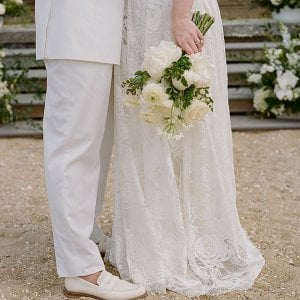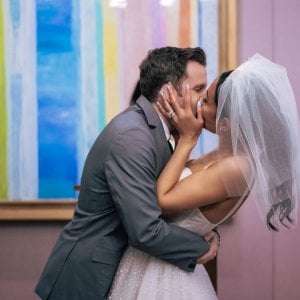Should you invite your ex? How do you tell your future mother-in-law her dress is too sexy? Discover how other brides handled these and other challenges.
By: Michele MeyerPlanning your wedding is a huge undertaking, but those weeks and months are also some of the best and most exciting times you’ll probably ever have.
Of course, that doesn’t mean you’re not going to hit a few snags along the way—you know, like figuring out how to ensure your divorced parents and their significant others get along on your big day, or the right way to let your guests know their precious little ones aren’t welcome at your sophisticated affair. As a result, you may find yourself moaning with misery when you should be humming “Here Comes the Bride.”
Need help sorting things out? You’re in luck. Meet six women who’ve successfully solved some common pre-wedding problems.
My Two Dads
“I don’t know who should walk me down the aisle—my father, or my stepfather?”
Who would escort Gina Yager on her trip to the altar? Her father and stepdad both dreamed of that honor for the Las Vegas publicist’s September 2001 wedding to Ian Yager. Though Gina’s parents had divorced when she was two, her biological father, John, while often unable to support Gina financially, had always been a presence in her life. “He was there for me emotionally,” says Gina.
Yet, when Gina’s mom remarried, her new husband, Ken, became a loving and devoted parent to the now-five-year-old girl—cheering her on in gymnastics, helping her do homework and giving advice as she grew up. He also offered to foot the bill for her wedding when her birth father said he was unable to help out. The result: Ken and John both felt they had the sole right to give their daughter away. “I was caught in the middle,” says Gina.
Her solution? Both fathers would walk her down the aisle. “First, I took my father aside and told him, ‘You may not like it, but I want you and Ken to split the walk,’ ” says Gina. “ ‘I’d like you to start it and Ken to give me away. Ken loves me, he’s given me so much, and I want to reciprocate.’ Next, I told my stepdad, ‘I want to give you both this opportunity since you both are a part of my life. I’m his biological daughter and you developed me into who I am today.’ I also asked him to answer the officiant’s question, ‘Who gives you away?’ with ‘Her mother, father and I do,’ not just ‘Her mother and I do.’ ”
Despite some initial resistance—the two fathers quibbled over exactly how many steps each would take—Gina’s wedding day went off without a hitch. “Both of my dads came around, realizing it was my day and that this is what I wanted,” says the bride. “Everyone was so happy at the wedding, especially when I did two father-daughter dances. It was a truly spectacular day.”
In the Spotlight
“My fiancé insists his son be in our ceremony, but I’m worried he’ll steal my thunder.”
When her fiancé, Louis Goldberg, first requested his then-seven-year-old son Matthew, a child from Goldberg’s previous marriage, serve as best man in the couple’s June 2002 ceremony, Staci Vernick, of Plymouth Meeting, Pennsylvania, wasn’t thrilled with the idea. “First of all, I wasn’t sure he could handle the responsibility,” says Staci. “I thought he might feel shy or uncertain taking center stage, or even act out if he felt his dad wasn’t paying enough attention to him, which is a normal reaction for a kid who’s about to get a new stepmom. But I admit I also didn’t want to share the spotlight: An adorable child might be too much of a scene-stealer.”
After discussing her worries with her fiancé, Staci and Louis decided to name Matthew co-best man alongside family friend Frank Carney, who would be there if Matthew got anxious or forgot what he was supposed to do. Then the couple assigned Matthew additional jobs that would make him feel like an extra-special part of the celebration, and prepped him for months.
On the wedding day, Matthew greeted guests and handed out yarmulkes before the Jewish ceremony, then stood next to his dad through it, even placing a glass under his father’s foot for the traditional glass-breaking ritual. “He carried it off with great maturity for a seven-year-old,” says Staci. “Matthew felt important and proud that we’d trusted him with such big responsibilities, and because he was so well-behaved I never felt like I was competing with him for the spotlight.”
Looking back, Staci realizes Matthew’s role helped unite the three of them as a family. “We now have cherished memories that we wouldn’t have had if Matthew hadn’t been a part of the wedding,” says Staci. “If involving your fiancé’s children is important to him, you have to make it work. Think of it this way: This is your first step as a married couple—and a family—and you don’t want to get off on the wrong foot.”
Taking Attendants
“How do I tell my friends they won’t be bridesmaids?”
Last among her friends to marry, Kristina Junger-Godfrey, a publicist in Newport Beach, California, was a bridesmaid in a dozen weddings by the time she wed Todd Godfrey in April 2003. That left a mind-numbing number of potential bridesmaids. But Kristina’s budget couldn’t accommodate such a large wedding party; she also wanted a small affair. So what did she do?
Since she couldn’t have all 12 of them, and she didn’t want to have to choose among them, Kristina decided none of them would take part in the ceremony. “I gently explained that, instead of bridesmaids, I would be having my mother stand next to me, and my husband’s mom next to him,” says Kristina. “Only one of them—one of my two best friends—tried to sway me. Wanting to be by my side, sharing my joy, as I had at their weddings, Nicole suggested that only she and my other closest friend be attendants. I told her that I wouldn’t be comfortable doing that because then the others would wonder why they weren’t up there, too.”
Nicole was still hurt, so in order to assuage her feelings Kristina made a concession: She invited those two women’s four-year-old daughters to serve as flower girls, which in turn gave her an excuse to invite the two mothers to the rehearsal dinner (including all the other would-be bridesmaids would have been far too costly). Fortunately, Nicole was delighted—and ended up taking on some bridesmaid responsibilities anyway, like hosting a bridal shower and the bachelorette party. She also attended every one of Kristina’s gown fittings.
“I’d worried so much about this dilemma that I lost sleep at times,” says the bride. “I believe a wedding isn’t just for you, but also your friends and family. I’m just lucky that I have great friends who wanted to participate in my special day, and yet bowed out graciously when that wasn’t possible.”
Not for Tots
“We want a child-free wedding, but several of our guests are resisting.”
When Martha Gold*, a New York City public relations executive, marries her fiancé, George*, in May 2004, no children under the age of 12 will be in attendance. “We both have huge families, and if we invited the little ones we’d be up to 450 guests,” she says. “While we love children, we also want a sophisticated affair just for grown-ups, without a lot of young ones around.”
Yet, when the couple informed some of their relatives of this decision, they were amazed at the reactions. “Some of my relatives assumed that only other people’s kids wouldn’t be invited!” says Martha. “My cousin said, ‘Oh, everybody will understand you can only invite your closest cousins’ kids.’ It was embarrassing to have to repeat, ‘We’re not having kids there at all—and that includes yours,’ but I was very firm. I added that having children would simply be too costly.”
While some relatives understood, others were resentful. “I got a few cold stares,” says Martha. “But I don’t really care. I’d love to be able to invite everyone’s kids but we simply can’t, so they’ll just have to accept that.”
Ex Marks the Spot
“I’d like to invite my former boyfriend to the reception, but my fiancé says ‘no way.’ ”
Perhaps no other topic is as divisive among soon-to-be-brides and -grooms as the question of whether to invite old flames to the wedding. “My advice: Talk about it long before the wedding so you’re not arguing on your way to the altar,” says Joanne Kasmally* of Southern California, who learned this lesson the hard way. She and her husband, Jason*, were married in a California courthouse in October 2002 without family or friends present, then celebrated their nuptials with a reception in her parents’ hometown of Miami, Florida, in December.
Two days before they were to fly to Miami, Joanne mentioned to her new husband that she’d invited her ex-boyfriend, with whom she’d remained good friends since their breakup five years earlier. “Jason got really upset,” she recalls. “He declared that if my ex came, he would not. He said he suspected I still had feelings for this man. I was horrified.”
So Joanne did the only thing she felt she could do. She phoned her ex and explained the situation honestly. She said, “I’m sorry to tell you this, but Jason and I have been married for only two months, and I have to ask that you don’t come. If you do, my husband won’t.” Says Joanne, “It was the hardest thing I’ve ever done, because this man was like a brother to me, and I also knew he’d already booked his hotel and rental car.”
In hindsight, Joanne admits she should have told Jason about inviting her ex months before the reception, like when the invitations went out in October, instead of waiting as long as she did. She believes the time factor definitely played a part in his strong reaction, and adds, “Telling him earlier would have given us more time to work things out.”
Though she still doesn’t agree with the way Jason handled things and was hurt that he didn’t trust her, Joanne has come to accept his position. “I made a commitment to Jason, not to my ex,” she says.
A Question of Taste
“I’m embarrassed by the dress my fiancé’s mother wants to wear. It’s tacky!”
When Catherine Jones’* soon-to-be mother-in-law showed her the dress she planned to wear to her wedding last year, Catherine blanched. “The style was pretty scary,” says the Santa Barbara, California, marketing executive. “I’d describe it as ‘Vegas showgirl’: tight, low-cut and covered with copper beads. It definitely wouldn’t have flattered her large frame, and it also didn’t fit the style of my wedding. We were planning a very simple affair, using mostly ivory and white shades—from my gown to the roses in my bouquet to the reception décor. That copper number just wouldn’t have worked.” So, Catherine went straight to her fiancé, Jeff*, to discuss how to resolve the situation. She described the dress, adding, “I don’t want to tell your mom I don’t like her outfit.”
The couple’s solution: They would inform Jeff’s mother that he’d treat her to an expensive dress for the occasion, as a birthday gift. “I also offered to shop with her,” says Catherine. “I steered her to a few gowns I liked and reminded her, ‘Price is no object.’ When she veered toward something neon, I said, ‘You’ll be standing next to my mom, who’s wearing cream, and I would really appreciate it if your gown went with my wedding colors.’ ”
Fortunately, the groom’s mother settled on a fitted, vanilla-colored silk V-neck top and matching long skirt that suited her dark hair and blue eyes, as well as the wedding scheme. “It was a simple, tasteful, flattering dress that was well worth the money we spent,” says Catherine. “She’ll probably never wear it again, but it was the best she’s ever looked!”
*Names were changed in this article for privacy purposes.






